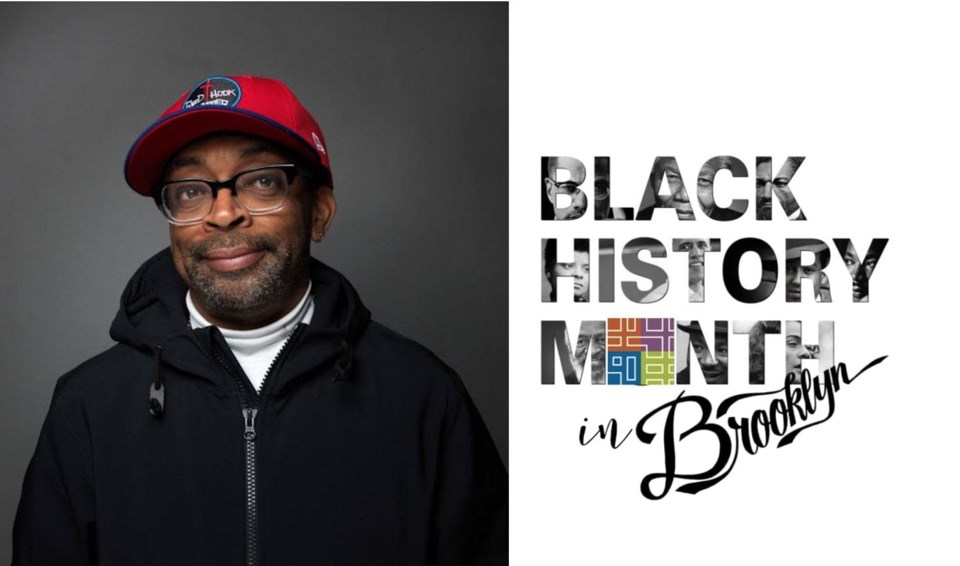Actor, director, producer and writer Spike Lee was born Shelton Jackson Lee on March 20, 1957, in Atlanta, Georgia, and soon moved to Fort Greene.
Growing up in a relatively well-off African-American family, Lee, who attended John Dewey High School in Gravesend, was making amateur films by age 20.
"I didn't dream about being a director," said Lee. "I didn't know, I wanted to do something with film until the summer between my sophomore and junior years at Morehouse College in Atlanta."
His first student film, Last Hustle in Brooklyn, was completed when he was an undergraduate at Morehouse College. Lee went on to graduate from the New York University Film School in 1982. His thesis film, Joe's Bed-Stuy Barbershop: We Cut Heads, won a Student Academy Award.
Lee became a director of promise with his first feature film, She's Gotta Have It, in 1986. The film was shot in two weeks and cost $175,000 to make, but grossed more than $7 million at the box office, making it one of the most profitable films created in 1986 and allowing him to found his own production company, 40 Acres and a Mule Filmworks in Fort Greene.
No stranger to controversy for certain provocative elements in both his films and public statements, Lee often takes a critical look at race relations, political issues and urban crime and violence. His 1989 film, Do the Right Thing, examined all of the above and was nominated for an Academy Award for Best Original Screenplay.
Subsequent films, including Malcolm X, Mo' Better Blues, Summer of Sam and She Hates Me, continued to explore social and political issues. 4 Little Girls, a documentary about the 16th Street Baptist Church bombing in 1963, was nominated for an Academy Award in 1998.
"I don't think my films are going to get rid of racism or prejudice," said Lee in an interview. "I think the best thing my films can do is provoke discussion. I don't think racism can be eliminated in my lifetime ... or my children's or grandchildren's. But I think it's something we have to strive for. I'm going to keep working toward that day coming."
In 2006, Lee directed and produced a four-hour documentary for television, When the Levees Broke: A Requiem in Four Acts, about life in New Orleans in the aftermath of Hurricane Katrina. He also did well at the box office that year with the crime caper Inside Man, starring Clive Owen, Jodie Foster and Denzel Washington.
Lee has also had success in directing television commercials, most famously opposite Michael Jordan in Nike's Air Jordan campaign. Other commercial clients include Converse, Taco Bell and Ben & Jerry's.
Lee's 2008 feature Miracle at St. Anna, about four African-American soldiers trapped in an Italian village during World War II, was praised for bringing the oft-overlooked experience of Black infantrymen — known as Buffalo Soldiers — to the big screen. Lee followed with a variety of projects, including documentaries of Kobe Bryant and Michael Jackson and a remake of the Korean revenge film Oldboy. In 2012, he reprised his Do the Right Thing character of Mookie in Red Hook Summer.
Lee's 2015 film Chi-Raq, an adaptation of Aristophanes's Lysistrata set in modern-day Chicago, was the first feature produced by Amazon Studios. That year, the acclaimed filmmaker also received an honorary Oscar at the Academy of Motion Picture Arts and Sciences' annual Governors Awards.
Through his production company 40 Acres and A Mule Filmworks, Lee continues to create and direct both independent films and projects for major studios, as well as working on story development, creating an internship program for aspiring filmmakers, releasing music, and community outreach and support.
Lee works as an educator as well. He has taught at New York University and also at Harvard. In March of 2002, Lee became the artistic director of NYU's Kanbar Institute of Film and Television.
In 2018, Lee again dove into the topic of race relations with BlacKkKlansman, the story of an African-American detective's success at infiltrating the KKK in the 1970s. Released one day before the one-year anniversary of the white nationalist rally in Charlottesville, Va., the film closes with footage from Charlottesville.
"That was one of the things we wanted to do, connect the past to the present," Lee said. "We did not want this to just be a history lesson. Even though it took place in the '70s, we still wanted it to be contemporary."
The film went on to garner an impressive six Academy Award nominations, landing the longtime filmmaker his first competitive Oscar win for Adapted Screenplay.
"This film will stand the test of time being on the right side of history," Lee said after receiving the award.
Lee has also directed several documentaries, including 4 Little Girls, When The Levees Broke, American Utopia and NYC Epicenters 9/11→2021½.
Other films include Crooklyn (1994), Clockers (1995), 25th Hour (2002), Inside Man (2006), and Da 5 Bloods (2020). The films Do the Right Thing, Bamboozled, Malcolm X, 4 Little Girls, and She's Gotta Have It were selected by the Library of Congress for preservation in the National Film Registry for being "culturally, historically, or aesthetically significant."
In a career that spans decades, Lee has uncompromisingly tackled the uncomfortable truths of American politics and race relations.
Fellow filmmaker John Singleton said of Lee, "No other Black contemporary entertainer can claim to enlighten so many young Black people." But, he added, Lee wants even more to prove "that an all-black film directed by a black person can still be universal."
Spike Lee, we acknowledge your enormous talents, and we honor your contributions.
*Sources: IMdb, biography.com




